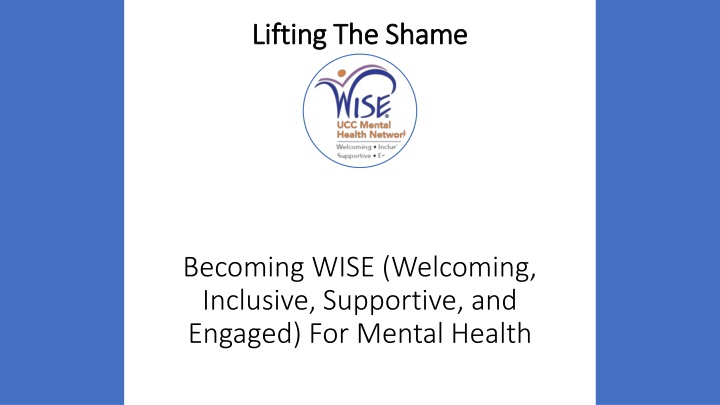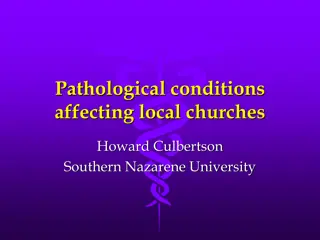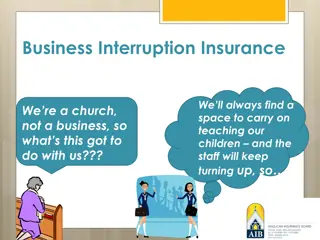Embracing Mental Health Challenges in WISE Churches
Embracing mental health challenges in WISE churches involves creating welcoming, inclusive, supportive, and engaged environments for individuals coping with mental health issues, substance use disorders, and brain disorders. These sacred spaces of radical belonging aim to combat the stigma and discrimination faced by many, especially older adults, who are often marginalized and unsupported in traditional congregations. By prioritizing care and inclusivity, WISE churches strive to address the needs of individuals experiencing despair and mental health challenges, promoting better overall well-being and reducing the negative impact of untreated conditions.
Uploaded on Sep 28, 2024 | 1 Views
Download Presentation

Please find below an Image/Link to download the presentation.
The content on the website is provided AS IS for your information and personal use only. It may not be sold, licensed, or shared on other websites without obtaining consent from the author.If you encounter any issues during the download, it is possible that the publisher has removed the file from their server.
You are allowed to download the files provided on this website for personal or commercial use, subject to the condition that they are used lawfully. All files are the property of their respective owners.
The content on the website is provided AS IS for your information and personal use only. It may not be sold, licensed, or shared on other websites without obtaining consent from the author.
E N D
Presentation Transcript
Lifting The Shame Lifting The Shame Becoming WISE (Welcoming, Inclusive, Supportive, and Engaged) For Mental Health
Greetings from the National Setting of the United Church of Christ
UCC Disabilities Ministries Accessible to All (A2A) www.uccdm.org
Becoming WISE means: Covenanting to become, and intentionally remain, sacred places of radical belonging that are WISE: Welcoming, Inclusive, Supportive & Engaged with individuals experiencing despair and/or living with mental health challenges, substance use disorders, and brain disorders.
Why we need WISE churches: "Many people living with mental illness are shunned, feared and discriminated against. . . . Consequently, they are not included in the network of care our congregations normally extend to a member who is ill. They struggle through alone or with the help of a few close family members they trust to keep their illnesses secret. Alan Johnson UCC MHN Chair Emeritus
Why we need WISE churches: We need WISE Congregations for Older Adults One in four older adults experiences some mental disorder including depression and anxiety disorders, and dementia. This number is expected to double to 15 million by 2030. Depression affects seven million older Americans, and many do not receive treatment.
Why we need WISE churches: The number of older adults with substance abuse problems is expected to double to five million by 2020. One in five older adults currently experiences misuse of alcohol and prescription medications. Two-thirds of older adults with mental health problems do not receive the treatment they need. Current preventative services for this population are extremely limited.
Why we need WISE churches: Untreated substance abuse and mental health problems among older adults are associated with poor health outcomes, higher health care utilization, increased complexity of the course and prognosis of many illnesses, increased disability and impairment, compromised quality of life, increased caregiver stress, increased mortality, and higher risk of suicide.
Why we need WISE churches: People aged 85+ have the highest suicide rate of any age group. Older white men have a suicide rate almost six times that of the general population. Source: National Council on Aging at www.ncoa.org
Reality Check Mental Illness and Substance Use Disorders are often called the No Casserole Conditions. Where are your Casseroles? How does your congregation show up in practical ways for people struggling with mental health, substance use issues, or brain disorders? Would you like to do more to share Christ s love with everyone struggling?
You are ready to become WISE Fulfilling all the WISE steps ensures that a faith community has engaged in education on mental health challenges; examined its overt and unconscious stigma around mental illness and brain differences; and voted to proclaim itself a community of radical belonging for individuals and families living with mental health challenges.
Ten Steps to Becoming a WISE 1. Consult with your pastor/faith leader 2. Form a WISE Team 3. Connect with the Mental Health Network at www.ucc-mhn.org and examine available resources 4. Develop an approach that offers education and worship that challenges stigma and leads to the congregation s vote to become a WISE
Ten Steps to Becoming a WISE 5. Draft your WISE Covenant 6. Involve your church s leadership in engaging the WISE Covenant 7. Vote on your WISE Covenant 8. Certify and celebrate becoming WISE 9. Publicize 10. Turn to the future
Good First Step: Host a Mental Health First Aid Class Mental Health First Aid is an 8-hour course that teaches you how to help someone who is developing a mental health problem or experiencing a mental health crisis. The training helps you identify, understand, and respond to signs of addictions and mental illnesses. For more information: www.mentalhealthfirstaid.org
Good Next Step: Companionship Training This is a ministry of presence, a relationship responding to isolation, suffering and supportive of healing and recovery. It welcomes the stranger, building a circle of care with those facing emotional and mental health challenges. It s rooted in being sensitive, compassionate, and concerned. Pathways to Promise, an interfaith ministry. www.thecompanionshipmovement.org
Other WISE Steps Begin speaking about mental health challenges and substance use disorders during community prayer times. Invite mental health community experts to speak about mental health in your church. Host a mental health book study group: Blessed are the Crazy and The Lifesaving Church. Start a mental health support group or host a NAMI group at your congregation
For More Ideas, go to www.mhn For More Ideas, go to www.mhn- -ucc.org ucc.org contact me: Rev. Dr. Sarah Lund lunds@ucc.org






















